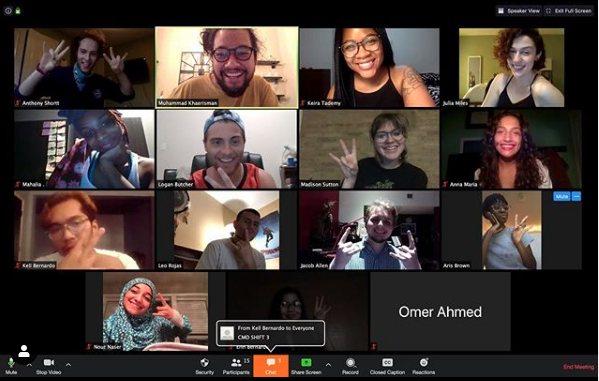Today I’m starting an interview series on this blog called: Writer’s Notes From COVID NOLA. This series will highlight how New Orleans writers are coping during the quarantine due to the COVID-19 outbreak. Writer Annell López is up first. Annell is a Dominican immigrant fiction writer and an assistant poetry editor for the Night Heron Barks who is working on a collection of short stories. In her free time, she documents her travels to independent bookstores across the country on Instagram, @annellthebookbabe.
How has the COVID-19 pandemic impacted you personally and professionally?
I have struggled to maintain my writing routine. Though I’m not lacking motivation, I find it really hard to focus. There have been some good days where I sit and write with ease, and then there have been days where I am trudging through, forcing myself to put pen to paper.
Isolation has been taxing in many ways. But it has also reminded me of how fortunate I am. I have friends and family checking in on me constantly. I am surrounded (virtually) by kind people who make me feel like things will be all right.
What books are you reading while quarantined?
I’ve read so many! I loved Red at the Bone by Jacqueline Woodson, Ordinary Girls by Jaquira Díaz, These Ghosts Are Family by Maisy Card, We Were Promised Spotlights by Lindsay Sproul, Mostly Dead Things by Kristen Arnett, The Lost Book of Adana Moreau by Michael Zapata, and poems from Godspine by Terri Muuss and Demolition in the Tropics by Rogan Kelly. These works have become my companions during this isolation.
If you knew five months ago what you know now, how would you have prepared for this moment?
During those afternoon happy hours, I would have listened more attentively to my friends. I would have hugged them a little tighter, loved them a little harder.
Have you attended or participated in any virtual readings? Do you think they’re here to stay or do you prefer in-person readings?
I am so grateful that they exist and I hope they’re here to stay. The Creative Writing Workshop at the University of New Orleans and Catahoula zine have hosted some lovely readings on Zoom. Under the Creole Chandelier, a reading series in town, also hosts an open mic every Sunday night on Zoom. I love popping in there and listening to people read their work. It’s helped me cope. Though I prefer in-person readings, virtual readings have made access to creatives from other cities possible, and people from across the country now have access to us as well. Everyone in the country should have access to our literary magic in New Orleans!
What’s your hope for New Orleans during and after this pandemic?
New Orleans is synonymous with resilience, with strength. New Orleanians are some of the most soulful, courageous, and creative people in this country. This will pass, and when it does we will be blown away by the creative outburst that follows.
I am sure New Orleanians will continue to love and support one another just as fiercely as they always have.
Kelly Harris is the literary outreach coordinator for Poets & Writers in New Orleans. Contact her at NOLA@pw.org or on Twitter, @NOLApworg.





